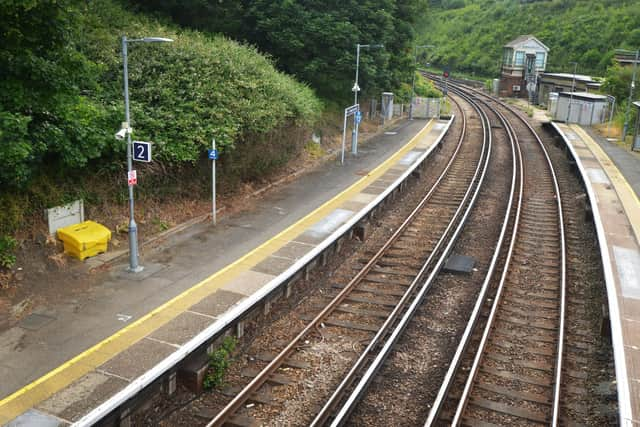Rail strikes in Sussex: 'This will make it even harder to rebuild passenger numbers'
and live on Freeview channel 276
Thousands of RMT union members voted to walkout across Network Rail and train operating companies today (Tuesday June 21), Thursday June 23 and Saturday June 25.
Southeastern is one of the operators, and while Govia Thameslink Railway, which runs Southern and Thameslink services, is not, its network is still massively affected.
Advertisement
Hide AdAdvertisement
Hide AdPassengers are being advised not to travel unless essential with very few services running on strike days and disruption also expected on non-strike days.


MPs across Sussex have shared their thoughts on the industrial action.
Bexhill and Battle MP Huw Merriman said: “I am very sorry for the disruption suffered by passengers this week. We had a terrible time with strikes on Southern Rail in 2016-17. I applaud Southern staff who vote against industrial action.
Advertisement
Hide AdAdvertisement
Hide Ad"They must know how damaging strikes would be. Alas, their colleagues in Network Rail have gone on strike so this has shut our local network regardless.
“We need everyone who takes pride in our railway to come together and agree a new way forward to secure its future and as well as the jobs which depend on it. This means the unions and industry agreeing on reforms which invests in technology.
"We can make the railways even safer and more efficient whilst freeing up money to fund improvements to workforce pay and the passenger experience. Now is not the time for a series of strikes which will make it even harder to rebuild passenger numbers.
“During the pandemic, a collective effort was made by the Government, industry and workforce to ensure our trains carried on running to get our essential workers to hospitals and other workplaces. In France, Spain and Italy, there is a legal requirement for between a third and a fifth of train services to continue to run during a strike. If the strikes continue, we will need these new laws to ensure that our railway and local economy are not damaged.”
Advertisement
Hide AdAdvertisement
Hide AdMaria Caulfield, Lewes MP, added: “I am disappointed that an agreement hasn’t been reached between the two sides. The only people suffering will be the hundreds of thousands who depend on the railway each day including school children and those with hospital appointments.”
East Worthing and Shoreham’s Tim Loughton said: This week’s strikes are hugely disruptive to people needing to get to work, to college and school in particular in the middle of the exam season and will cause a lot of damage to my constituents. The industrial action which has been supported by many Labour MPs is also completely unnecessary.
“At a time when everyone is facing very challenging cost of living pressures industrial action in support of unrealistic wage rises will only cause inflationary pressures and prolong the pain for everyone for longer.
"I do not understand why the rail workers consider themselves a special case over many other essential service workers who are also under a lot of pressure but are getting on with their jobs. During the pandemic the Government bailed out the railways with £16bn of taxpayers money to keep Britain moving and avoid job losses and a meltdown amongst the rail operating companies.
Advertisement
Hide AdAdvertisement
Hide Ad"It is extraordinary that this is the way the rail unions show their gratitude to the British public and this dispute should be called off as soon as possible and sensible negotiations restored.”
Sally-Ann Hart, Hastings and Rye MP, said: “The union-instigated strikes must be viewed through the lens of fairness.
“After rightly being supported by £16 billion of taxpayers’ money throughout the pandemic, and bearing in mind the resulting changes to the way people now use the railway network, proper reform is needed in the industry.
“It is not right or fair for the RMT to continue to ask for taxpayer subsidies without acknowledging this important point, and my focus is on the many workers and businesses in Hastings and Rye that will bear the brunt of the on-going industrial action which, if the union’s demands are met, also threatens to worsen the inflationary pressures that we are all experiencing too.”
Advertisement
Hide AdAdvertisement
Hide AdYesterday, Worthing West MP Sir Peter Bottomley said in the House of Commons: “In my view, my local passengers—most of whom earn less than rail workers and some of whom do not earn anything at all because they are students trying to take exams this week—would prefer it if both sides of the House could call on the unions to postpone these disputes until they will not affect so many people so harshly.”
Eastbourne MP Caroline Ansell said: “I am really concerned on multiple levels about these strikes mainly around how it will affect our public services like NHS staff getting to work and the knock-on effects this brings with increased ambulance times due to road congestion.
“I spoke with our local health leaders yesterday about resilience in the system. In addition, the timing for our local visitor economy couldn’t be worse as we have the tennis on at the moment in Eastbourne and some visitors will struggle to come.
“I just cannot see how this strike will achieve anything at such a time. Network Rail and the train operators want to modernise a system in desperate need of change. Huge pay rises in the public sector will add to inflationary pressures and potentially tip us into recession.
Advertisement
Hide AdAdvertisement
Hide Ad“It is also spectacular self-harm when people need to be encouraged back on the trains and passenger numbers remain below pre-pandemic levels.
“There is an added disappointment when £16 billion of taxpayers’ money – that’s £600 per household - was poured into the rail network during the pandemic to keep it going and safeguard jobs.”